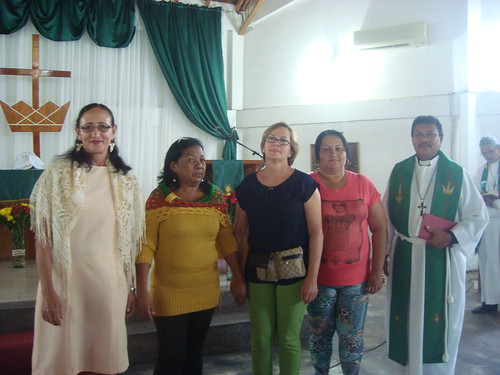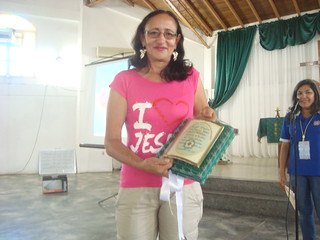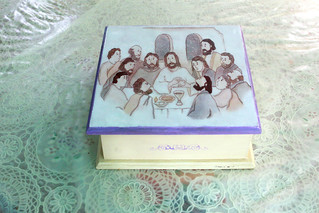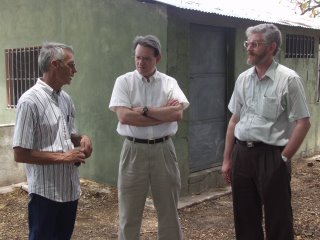 |
| Officers of SOLUDAVE 2016-2017: Luz Maria Henriquez de Ernst, president; Yuraima Gonzalez, vice president; Norma Vallenilla, treasurer; Aikel Rodriquez, secretary; Elías Lozano, pastoral counselor. |
The women of SOLUDAVE gathered in the city of Maturin, capital of the state of Monagas, Venezuela. I arrived in Venezuela in 2003 to serve as a volunteer for a mission project to revitalize rural Lutheran congregations in Monagas. After we were married, Luz Maria lived with me in Monagas for a time, and served as a deaconess with the mission project.
La Caramuca is on the other side of the country from Maturin. If everything were to proceed according to best-laid plans, the bus ride from La Caramuca to Maturin would last 14 to 15 hours. But few things proceed according to plan in Venezuela these days. Of course, it would have taken less time to travel to Maturin by air, but that is almost entirely out of the question. Airline tickets are hard to come by, certainly for international flights and also for in-country travel. Even if you can get plane tickets, there is no guarantee now that you will be able to make your connections.
Buying a bus ticket was not that easy, either. First, Luz Maria was told that she could not buy a ticket to Maturin before the day of departure. Then, on the day on which she wanted to depart, she was told, sorry, no tickets were available. So she had to go back the next day to purchase a ticket for a 9 p.m. departure. She almost did not make that bus because we had trouble finding a taxi to the terminal, even though she starting calling around 6 p.m. The bus left the terminal on time, but broke down on the highway at around 12:30 a.m. All of the passengers had to wait by the side of the road until another bus arrived at 5 a.m. Luz Maria did not arrive in Maturin until 9:30 that evening, after the convention had already started.
Then, for the return journey, she had to spend the night in the Maturin bus terminal in order to get passage back to La Caramuca. Fortunately, she was not alone in a deserted bus terminal in the wee hours, because the terminal was crowded with many other people in the same predicament. All of this is a result of the deteriorating state of the Venezuelan economy. There are fewer taxis to be found, and the buses break down because of the scarcity of automotive parts. And that's just one thing. The cost of travel is also much higher, because of hyper-inflation, and the rising level of violent crime everywhere also makes travel in Venezuela more of an adventure than most people would desire.
Nonetheless, Luz Maria considered her journey to Maturin worth the effort. Luz Maria is one of three women recognized as deaconesses by the national church (the others are Carmen Gamboa of the Lutheran mission in Cagua, in Aragua state; and Elsy Valladares de Machado of La Paz (Peace) Lutheran Church in Petare). Luz Maria always encourages more women to become involved in the national deaconess program. She proposed at the SOLUDAVE convention that Cruz Maria Islanda de Ventura be recognized as a deaconess. Cruz Maria is the wife of Adrian Ventura, pastor of Cristo Rey (Christ the King) Lutheran Church of Maturin.
Luz Maria brought back many handmade gifts that the women of each congregation represented at the convention made for all the other ladies. There also was a special gift for our mission: A box to hold the sacramental bread made by Yudith Sanchez, a member of Cristo Rey.
I thank God that Luz Maria and all the other women have returned safely to their homes. The last time that Luz Maria just took for a getaway together was in 2010. We traveled to the state of Trujillo just because neither of us had been there before. I would like someday to once again travel to parts of Venezuela that I have not seen. I have never visited Angel Falls, the world's highest waterfall, nor the Relámpago de Catatumbo, the area of constant lightning strikes at the mouth of the Catatumbo River, and many other wondrous places. But God grant us for now the privilege of continuing our work in His name. Amen.












